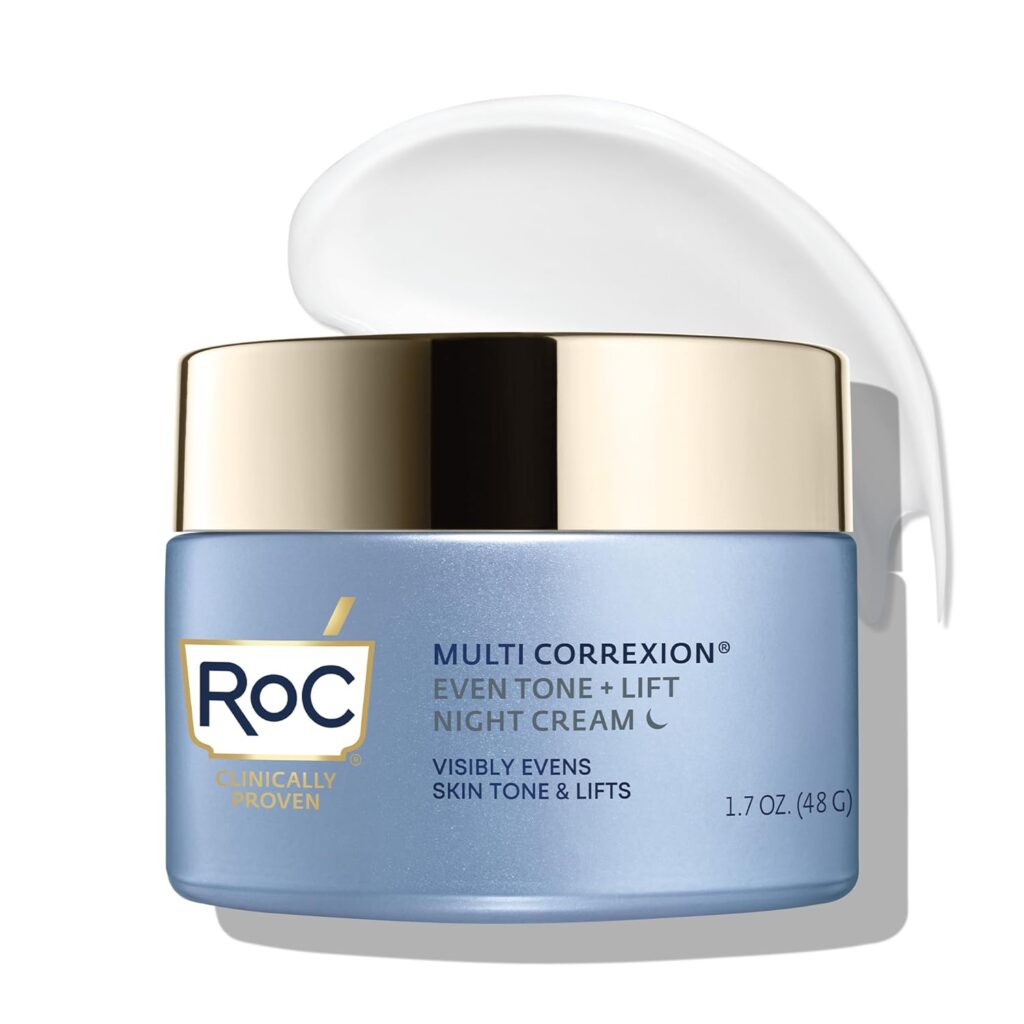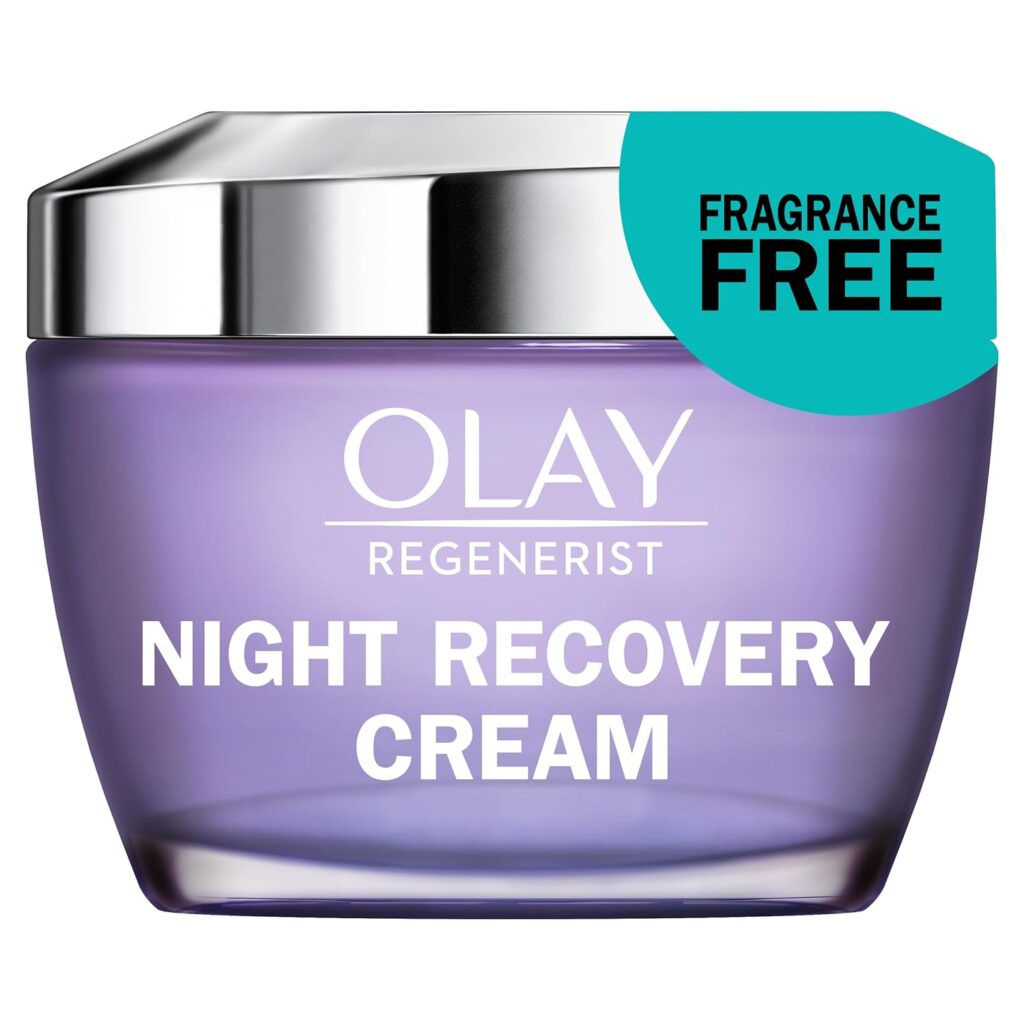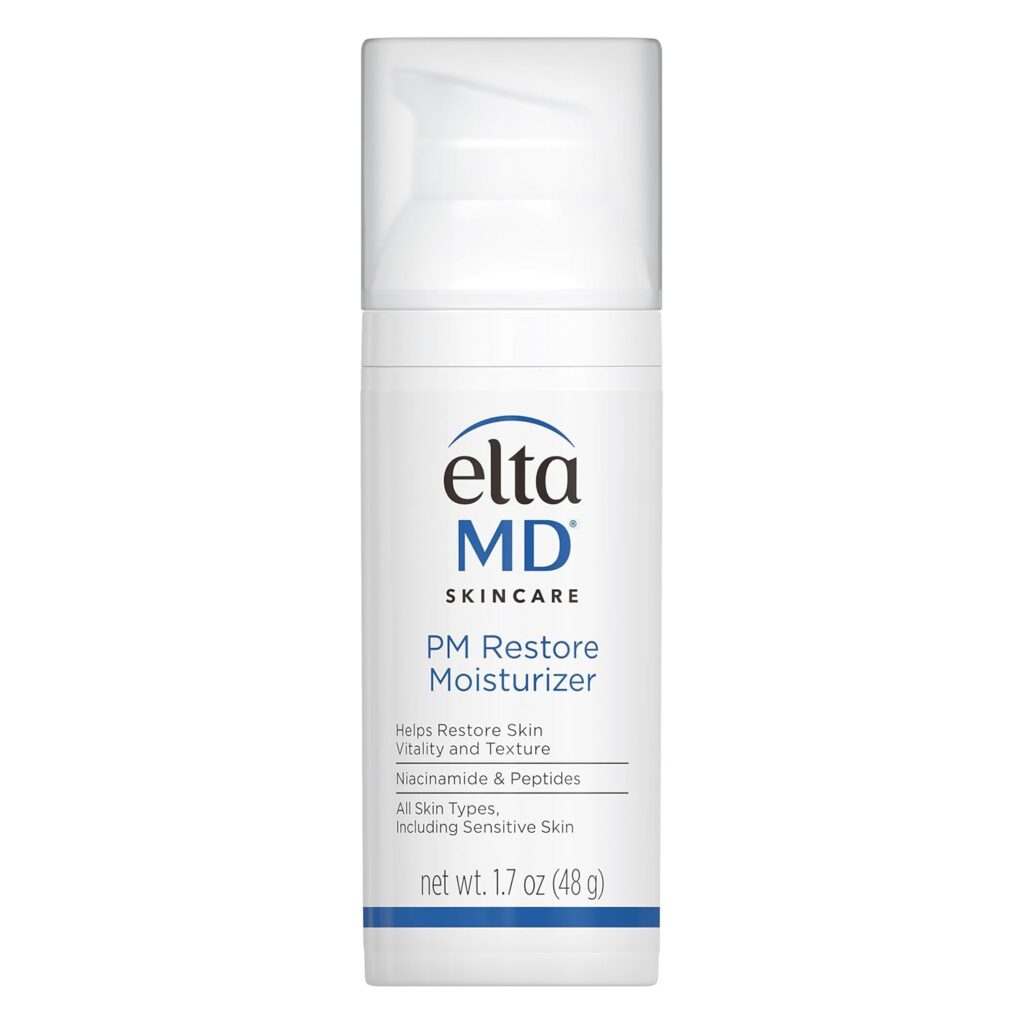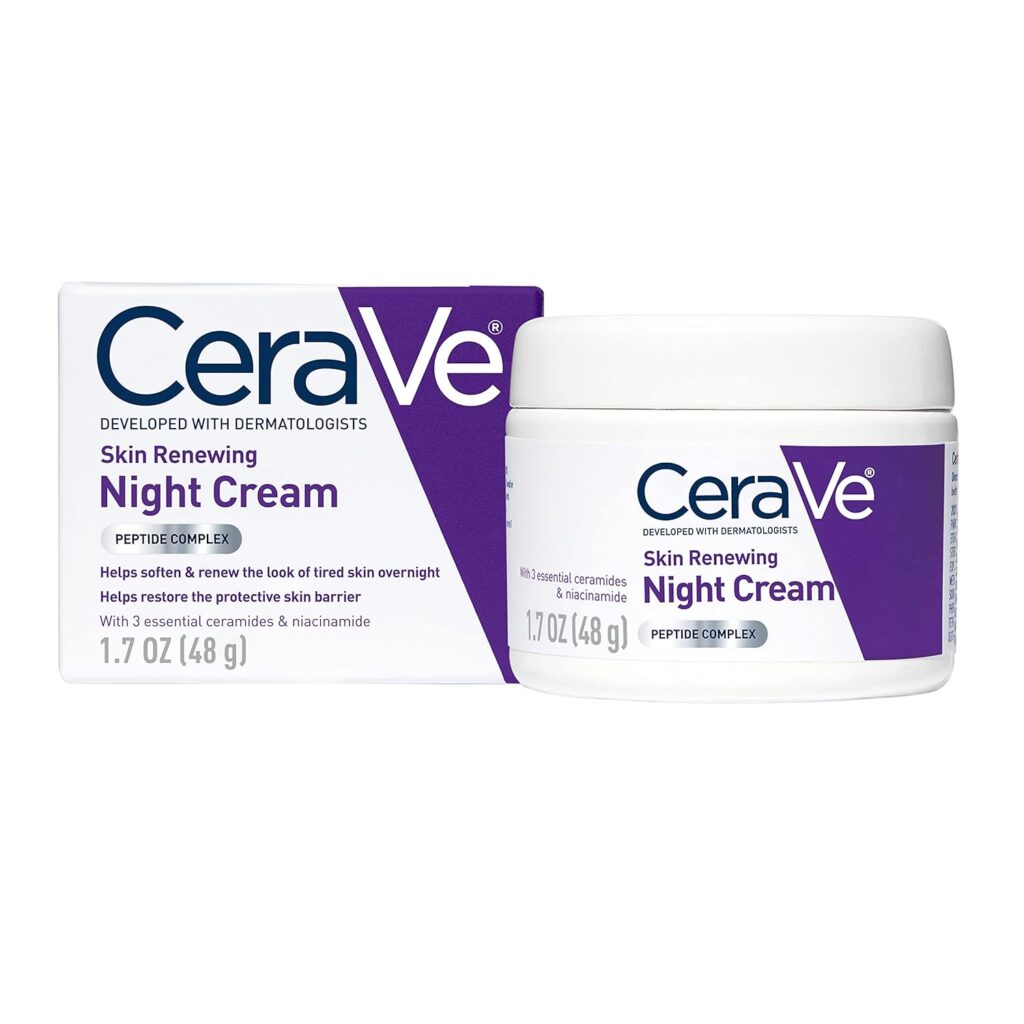How do you choose between the different night creams available on the market? Which one will suit your skin? I’ll list the top 4 night creams that help strengthen your skin barrier, and also help you decide which one is best for your skin type. I’ll rank them from good to best. But first, let’s answer the question: Why does a night cream help your skin repair and stay healthy?

Your skin has a special job—it protects your body from things like dirt, pollution, and drying out. This is called the skin barrier, and it helps keep your skin strong, healthy, and full of moisture. At night, when you’re sleeping, certain creams can help your skin heal, lock in moisture for optimal hydration, and maintain your skin barrier to better defend against external stressors. Nighttime is also the time that your skin is more geared to restore itself.
When adding a night cream, you can give your skin a boost to be more efficient.
Which Ingredients Should You Look for in a Night Cream?
I think it is rare to find a night cream that contains all of the ingredients listed below, but look at the label of the night cream and find one that has most of these active ingredients:
- Ceramides: These lipid molecules are essential for maintaining the skin barrier’s integrity.
- Hyaluronic acid: A powerful humectant that draws moisture into the skin.
- Niacinamide: Helps improve skin barrier function and reduces inflammation.
- Peptides: Support collagen production and skin repair.
- Antioxidants: Protect the skin from free radical damage.
- Non-comedogenic formulas: Ensure the product won’t clog pores.
- Fragrance-free options: Ideal for sensitive skin types.
Now, let’s explore my top picks for the best night creams to strengthen your skin barrier.
4. RoC Multi Correxion 5 in 1 Restoring Night Cream
RoC has established itself as a trusted name in the skincare industry, and their Multi Correxion 5 in 1 Restoring Night Cream is a solid choice for those looking to address multiple signs of aging while supporting skin barrier function.
Key Features:
- Contains Hexinol technology to improve skin tone and texture
- Helps reduce the appearance of fine lines and wrinkles
- Hydrates and firms skin overnight
This night cream is light and smooth, so it sinks into your skin quickly. It’s perfect for people who don’t like creams that feel thick or greasy. A lot of people say their skin feels softer and looks brighter when they wake up after using it for a while.
The formula is gentle enough for everyday use, even for people with sensitive skin.
One of the special ingredients in this cream is called Hexinol. This is a special anti-aging ingredient made by RoC that helps make your skin firmer, bouncier, and smoother.
By working on all these things at once, the cream helps your skin look younger and stronger.
Even though the RoC cream has a lot of good things, some people think the smell is a little strong. If you don’t like strong scents or want a cream with no smell, this might not be the best choice for you.
Also, if you have really dry skin, you might need to use other moisturizing creams along with this one to keep your skin extra hydrated.
Despite these minor considerations, the RoC Multi Correxion 5 in 1 Restoring Night Cream stays a solid choice for those seeking a multi-tasking night cream that supports skin barrier function while addressing signs of aging.
3. Olay Regenerist Night Recovery Cream
Olay’s Regenerist Night Recovery Cream is a popular drugstore option that delivers impressive results when it comes to skin barrier support. This cream has gained a loyal following for its ability to provide high-end results at an affordable price point.
Key Features:
- Contains amino-peptide complex to aid skin cell regeneration
- Deeply hydrates skin overnight
- Fragrance-free formula
The Olay Regenerist Night Recovery Cream is smooth and feels fancy on your skin. It’s really good at making your skin look plumper and smoother, with lots of people saying their fine lines and wrinkles look smaller after using it for a while. The cream also helps make your skin stronger, so it can protect itself better.
One of the important ingredients in this cream is something called an amino-peptide complex. Peptides are tiny pieces of protein that help your skin make things like collagen and elastin, which keep your skin firm and stretchy. By adding these peptides, Olay helps your skin heal and get better at protecting itself.
This cream doesn’t have any smell, which is great for people with sensitive skin or those who don’t like scented products. It works for all kinds of skin and is less likely to cause irritation or allergies.
But, some people think the cream is a bit thick, especially if they have oily skin. If that’s you, it might be a good idea to use just a little or save it for the winter, when your skin needs extra moisture.
Despite its rich texture, the Olay Regenerist Night Recovery Cream absorbs well into the skin, leaving it feeling nourished as opposed to greasy. Many users report waking up with plumper, more hydrated skin, which is a testament to the cream’s ability to support the skin barrier throughout the night.
2. EltaMD PM Therapy Facial Moisturizer
EltaMD is a brand often recommended by dermatologists, and their PM Therapy Facial Moisturizer stands out when it comes to repairing and strengthening the skin barrier. This night cream offers an ideal balance of nourishing ingredients and a lightweight texture.
Key Features:
- Contains niacinamide and antioxidants to soothe and protect skin
- Lightweight, oil-free formula
- Helps improve skin tone and texture
The EltaMD PM Therapy moisturizer is light and feels like lotion, soaking into your skin quickly. It’s a great choice for people who don’t like thick creams or for those living in warmer places. Even though it feels light, it still gives your skin enough moisture and helps protect it while you sleep.
One of the main ingredients in this cream is niacinamide, which is also called vitamin B3. Niacinamide is really good for helping your skin stay strong and healthy.
It helps your skin make more ceramides (which help keep moisture in), reduces redness, and helps your skin stay calm.
These things together make your skin’s barrier stronger and better at protecting you.
The cream also has antioxidants, which help protect your skin from damage. These antioxidants fight off bad things that can harm your skin over time. This helps your skin stay healthy and protected from things like pollution.
This moisturizer is great for calming red or irritated skin, so it’s perfect for people with sensitive skin. It’s also oil-free and won’t clog your pores, which makes it good for people who get acne.
However, if you have really dry skin, you might need to use a thicker moisturizer on top of this one to make sure your skin stays hydrated enough.
Overall, the EltaMD PM Therapy Facial Moisturizer offers a sophisticated approach to nighttime skin barrier support. Its combination of nourishing ingredients, lightweight texture, and soothing properties make it a top choice for many skincare enthusiasts.
1. CeraVe Skin Renewing Night Cream
Taking the top spot in our list is CeraVe’s Skin Renewing Night Cream, a true standout when it comes to supporting and repairing the skin barrier. This night cream exemplifies CeraVe’s commitment to creating products that prioritize skin barrier health.
Key Features:
- Contains three essential ceramides to restore the skin barrier
- Includes peptide complex to help reduce fine lines and wrinkles
- Non-comedogenic and fragrance-free formula
The CeraVe Skin Renewing Night Cream is thick and creamy, but it soaks into your skin without feeling greasy. This makes it a good choice for all skin types.
One of the best thing about this cream is that it has three important ceramides. Ceramides are natural fats in your skin that help keep your skin strong and protected. They act like glue, holding your skin cells together to form a protective barrier.
By adding ceramides, CeraVe helps fix and improve your skin’s protective layer.
This cream also has a special ingredient called peptides, which help reduce fine lines and wrinkles. Peptides are tiny chains of protein that tell your skin to make more collagen, which makes your skin firmer and look younger. This cream works on both keeping your skin protected and fighting signs of aging.
Another great ingredient is niacinamide, which helps calm and soothe your skin, and hyaluronic acid, which keeps your skin really hydrated. Hyaluronic acid can hold a lot of water, making sure your skin stays plump and moist all night long.
Many people say their skin feels softer and more hydrated after using this cream. Even after just a few uses, the texture and moisture of your skin can get better.
This cream works for all skin types, but if you have very oily skin, it might feel a little heavy. But for dry or sensitive skin, it’s perfect for keeping your skin healthy and protected.
It’s also fragrance-free and won’t clog pores, which is great for people with sensitive skin or those worried about acne.
While all the night creams I’ve reviewed offer benefits for skin barrier support, CeraVe’s Skin Renewing Night Cream stands out for its comprehensive approach to skin barrier repair and overall skin health. Its combination of essential ceramides, peptides, and other skin-loving ingredients makes it our top pick for those looking to boost their skin barrier function overnight.
How to Choose the Right Night Cream for Your Skin Barrier
Selecting the perfect night cream for your skin barrier involves considering several factors:
1. Skin Type
Your skin type plays a crucial role in determining which night cream will work best for you. Here’s a quick guide:
- Dry Skin: Look for rich, emollient creams with ingredients like ceramides, hyaluronic acid, and glycerin.
- Oily Skin: Opt for lightweight, oil-free formulas that won’t clog pores.
- Combination Skin: Choose a balanced formula that hydrates without feeling heavy.
- Sensitive Skin: Seek fragrance-free, hypoallergenic options with soothing ingredients like niacinamide or aloe vera.
2. Key Ingredients
When shopping for a night cream to support your skin barrier, keep an eye out for these beneficial ingredients:
- Ceramides: These lipids are essential for maintaining skin barrier integrity.
- Hyaluronic Acid: A powerful humectant that draws moisture into the skin.
- Niacinamide: Helps improve skin barrier function and reduces inflammation.
- Peptides: Support collagen production and skin repair.
- Antioxidants: Protect the skin from free radical damage.
3. Texture Preference
Consider your personal preference when it comes to cream texture. Some people prefer rich, thick creams, while others favor lighter, more gel-like formulas.
Choose a texture that feels comfortable on your skin and encourages consistent use.
4. Specific Skin Concerns
In addition to supporting your skin barrier, you may have other skin concerns you’d like to address. Look for night creams that target multiple issues, such as:
- Fine lines and wrinkles
- Uneven skin tone
- Dullness
- Acne or blemishes
5. Patch Testing
Before fully incorporating a new night cream into your routine, it’s wise to perform a patch test. Apply a small amount of the product to a discreet area of your skin (like behind your ear or on your inner arm) and wait 24-48 hours to check for any adverse reactions.
6. Consistency is Key
Remember that the effectiveness of any skincare product, including night creams, relies heavily on consistent use. Choose a product that you enjoy using and can commit to applying regularly for the best results.
How to Incorporate Night Cream into Your Skincare Routine
To maximize the benefits of your chosen night cream and support your skin barrier, follow these steps:
- Cleanse: Start with a gentle, pH-balanced cleanser to remove makeup, dirt, and impurities without stripping your skin.
- Tone (Optional): If you use a toner, apply it after cleansing to balance your skin’s pH and prepare it for the next steps.
- Treat: Apply any serums or treatments you use, such as vitamin C or retinol.
These should go on before your night cream.
- Eye Cream: If you use a separate eye cream, apply it before your night cream.
- Night Cream: Take a pea-sized amount of your chosen night cream and gently massage it into your face and neck using upward motions.
- Facial Oil (Optional): If your skin needs extra nourishment, you can layer a facial oil over your night cream.
For best results, apply your night cream about 30 minutes before going to bed. This allows the product time to absorb into your skin before you lie down on your pillow.
The Science Behind Skin Barrier Function
Understanding the science behind skin barrier function can help you appreciate the importance of using a good night cream. The skin barrier, also known as the stratum corneum, is the outermost layer of our skin. It consists of:
- Corneocytes: Flat, dead skin cells that provide a physical barrier.
- Lipids: Including ceramides, cholesterol, and fatty acids, which fill the spaces between corneocytes and help keep moisture.
- Natural Moisturizing Factor (NMF): A mixture of compounds that help keep the skin hydrated.
A healthy skin barrier performs several crucial functions:
- Moisture Retention: It prevents excessive water loss from the body.
- Protection: It shields against environmental stressors, pollutants, and harmful microorganisms.
- Regulation: It helps maintain the skin’s pH balance.
- Sensation: It contains nerve endings that allow us to feel touch, temperature, and pain.
When the skin barrier is compromised, it can lead to various skin issues, including:
- Dryness and dehydration
- Increased sensitivity
- Inflammation
- Acne breakouts
- Premature aging
Night creams formulated to support skin barrier function work by:
- Replenishing essential lipids
- Providing intense hydration
- Promoting skin cell turnover
- Offering antioxidant protection
By using a night cream specifically designed to support your skin barrier, you’re investing in your skin’s long-term health and appearance.
Common Mistakes to Avoid When Using Night Creams
While night creams can be incredibly beneficial for your skin barrier, there are some common mistakes to avoid:
- Using Too Much Product: A little goes a long way with most night creams. Using too much can lead to clogged pores or wasted product.
- Applying to Damp Skin: While some products work well on damp skin, many night creams are best applied to dry skin for optimal absorption.
- Neglecting Your Neck: The skin on your neck is just as important as your face. Always extend your night cream application down to your neck and décolletage.
- Mixing Incompatible Ingredients: Be cautious when layering products. Some ingredients, like retinol and alpha-hydroxy acids, can irritate when used together.
- Expecting Overnight Results: While some night creams can provide immediate hydration, most benefits come with consistent use over time.
- Ignoring Expiration Dates: Expired skincare products can be less effective or even harmful. Always check and adhere to expiration dates.
- Not Adjusting for Seasons: Your skin’s needs can change with the seasons. You might need a richer cream in winter and a lighter one in summer.
- Skipping Night Cream When Traveling: Travel can be stressful on your skin. Don’t forget to pack your night cream, even for short trips.
By avoiding these common pitfalls, problems, issues, problems, issues, you can confirm you’re getting the most out of your night cream and supporting your skin barrier effectively.
The Role of Diet in Skin Barrier Health
While using a good night cream is crucial for maintaining a healthy skin barrier, it’s important to remember that skin health starts from within. Your diet plays a significant role in supporting your skin barrier function. Here are some key nutrients to include in your diet:
- Omega-3 Fatty Acids: Found in fatty fish, flaxseeds, and walnuts, these healthy fats help maintain skin hydration and reduce inflammation.
- Vitamin C: This antioxidant, found in citrus fruits, berries, and leafy greens, supports collagen production and protects against free radical damage.
- Vitamin E: Another powerful antioxidant, vitamin E (found in nuts, seeds, and avocados) helps protect skin cell membranes.
- Zinc: This mineral, present in lean meats, seafood, and legumes, aids in skin healing and helps regulate oil production.
- Probiotics: Found in yogurt, kefir, and other fermented foods, probiotics can help balance the skin’s microbiome, supporting overall skin health.
- Water: Staying well-hydrated is crucial for maintaining skin hydration from the inside out.
By combining a healthy diet with the use of a high-quality night cream, you’re providing your skin barrier with support both internally and externally.
The Impact of Lifestyle Factors on Skin Barrier Function
In addition to using the right night cream and maintaining a healthy diet, several lifestyle factors can significantly impact your skin barrier health:
- Sleep: Getting adequate sleep is crucial for skin repair and regeneration. Aim for 7-9 hours of quality sleep each night.
- Stress Management: Chronic stress can weaken the skin barrier. Practice stress-reduction techniques like meditation, yoga, or deep breathing exercises.
- Sun Protection: UV damage can severely compromise skin barrier function. Always use a broad-spectrum sunscreen during the day, even when it’s cloudy.
- Gentle Cleansing: Over-cleansing or using harsh products can strip the skin of its natural oils, weakening the barrier. Opt for gentle, pH-balanced cleansers.
- Avoid Hot Showers: Very hot water can strip the skin of its natural oils. Use lukewarm water when cleansing your face.
- Humidify Your Environment: Dry air can lead to skin dehydration. Consider using a humidifier, especially in dry climates or during winter months.
- Regular Exercise: Physical activity increases blood flow to the skin, delivering nutrients and oxygen that support skin health.
- Limit Alcohol and Smoking: Both can dehydrate the skin and speed up aging, compromising skin barrier function.
By addressing these lifestyle factors alongside your skincare routine, you can provide comprehensive support for your skin barrier health.
When to Consult a Dermatologist
While night creams can significantly improve skin barrier function for many people, there are times when it’s best to consult a dermatologist:
- Persistent Skin Issues: If you’re experiencing ongoing dryness, redness, or irritation despite using appropriate skincare products.
- Allergic Reactions: If you develop a rash, itching, or other signs of an allergic reaction to skincare products.
- Skin Conditions: If you have or suspect you have a skin condition like eczema, rosacea, or psoriasis.
- Acne That Won’t Clear: If over-the-counter products aren’t effectively managing your acne.
- Signs of Premature Aging: If you’re noticing early signs of aging and want professional advice on prevention and treatment.
- Skin Changes: If you notice any new or changing moles, spots, or other skin changes.
- Prescription Treatments: If you’re interested in prescription-strength treatments like retinoids.
- Personalized Advice: If you want a customized skincare routine tailored to your specific skin type and concerns.
A dermatologist can provide expert guidance, diagnose skin conditions, and recommend treatments that go beyond what over-the-counter products can offer.
People Also Asked
What ingredients should I look for in a night cream for dry skin?
For dry skin, look for night creams containing ingredients like hyaluronic acid, glycerin, ceramides, and fatty acids. These help to hydrate and lock in moisture, supporting the skin barrier.
Can I use retinol in my night cream if I have sensitive skin?
If you have sensitive skin, it’s best to introduce retinol slowly and in low concentrations. Look for night creams with encapsulated retinol or retinol choices like bakuchiol, which can be gentler on sensitive skin.
How often should I use a night cream?
Most night creams are designed for daily use. Apply your night cream every evening as part of your skincare routine for best results.
Is it necessary to use both a day cream and a night cream?
While not absolutely necessary, using both can be useful. Day creams often contain SPF and lighter hydrators, while night creams tend to be richer and focus on repair and regeneration.
Can men use night creams too?
Absolutely! Skin care is not gender-specific.
Men can benefit from using night creams to support their skin barrier and address concerns like dryness or signs of aging.
At what age should I start using a night cream?
There’s no set age to start using a night cream. Many people begin in their mid-20s to early 30s as a preventative measure, but it’s never too late to start caring for your skin barrier.
Can night creams help with acne?
Some night creams can help with acne, especially those containing ingredients like salicylic acid or niacinamide. However, for severe acne, it’s best to consult a dermatologist.
How long does it take to see results from using a night cream?
While some benefits like increased hydration can be immediate, more significant improvements in skin texture and barrier function typically take 4-6 weeks of consistent use.
Can I use night cream around my eyes?
Unless the product specifically states it’s safe for use around the eyes, it’s best to use a separate eye cream. The skin around the eyes is more delicate and may react differently to certain ingredients.
Are expensive night creams always better?
Not necessarily. The effectiveness of a night cream depends on its formulation and ingredients, not its price.
Many affordable options can provide excellent skin barrier support.
Key Takeaways
- A strong skin barrier is crucial for overall skin health and appearance.
- Night creams can significantly support and repair the skin barrier while you sleep.
- Look for ingredients like ceramides, hyaluronic acid, and niacinamide in your night cream.
- CeraVe’s Skin Renewing Night Cream tops our list for its comprehensive approach to barrier support.
- Consider your specific skin type and concerns when choosing a night cream.
Disclaimer: The information provided on this website is for informational purposes only and is not intended as medical advice. I may earn a commission from qualifying purchases made through affiliate links, including those from Amazon, at no extra cost to you.



